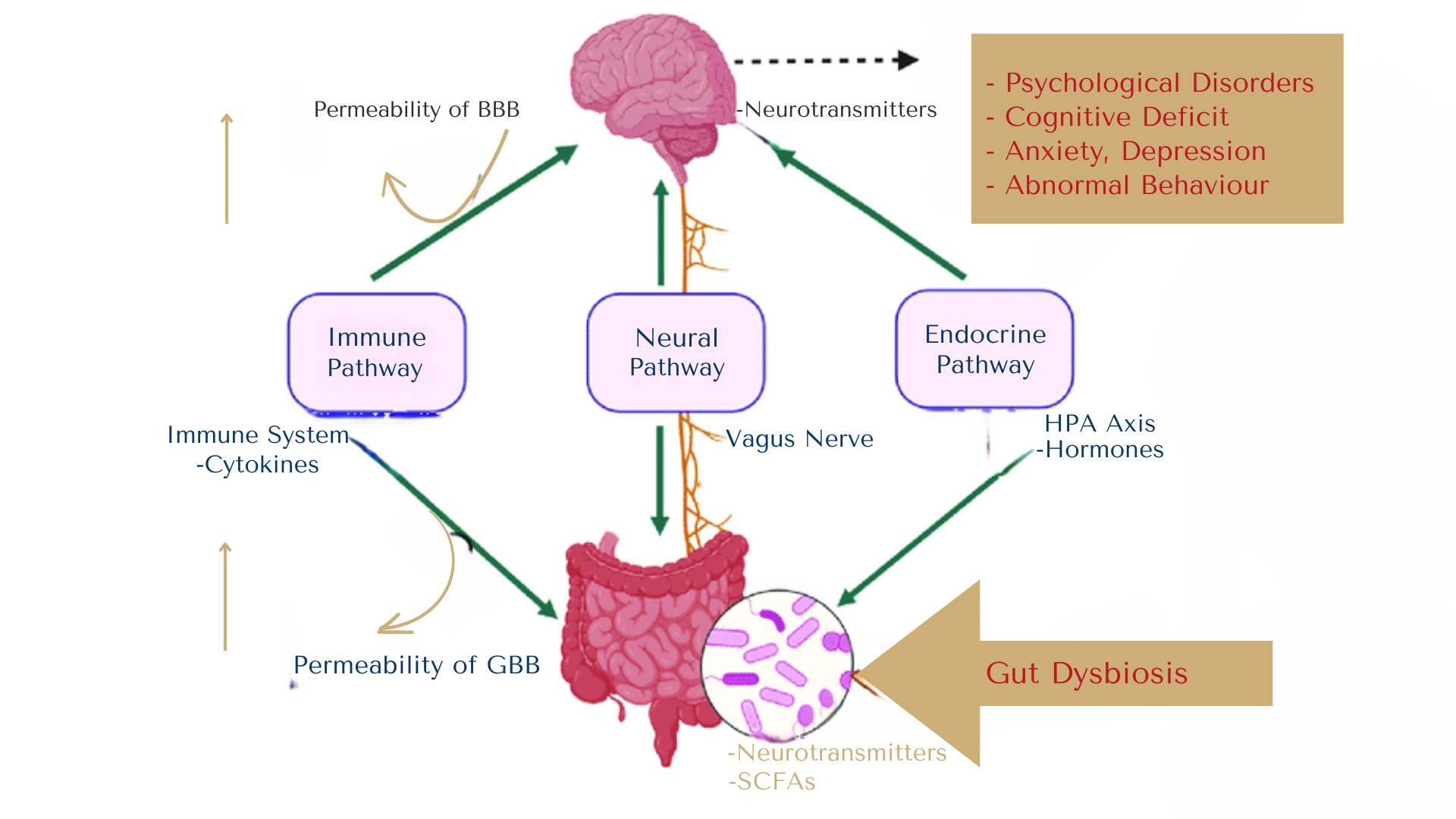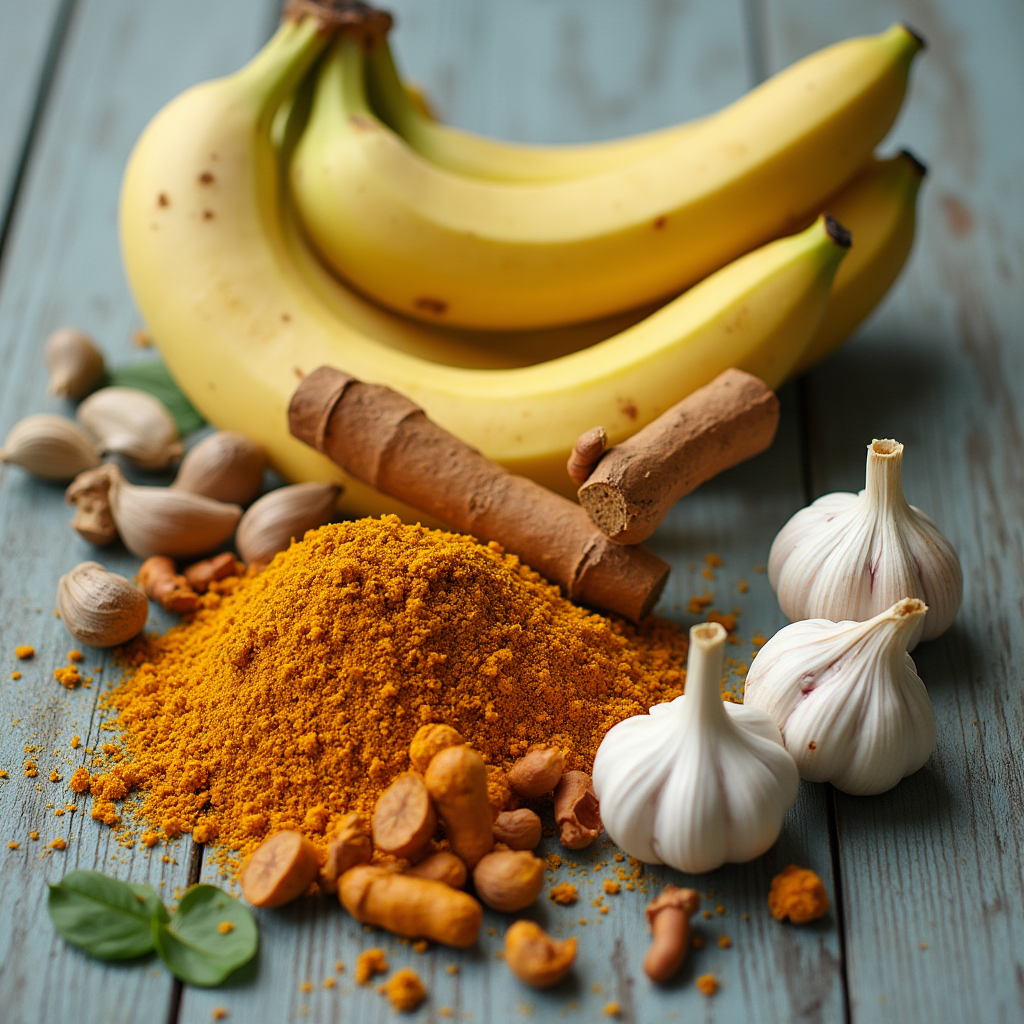
Gut Feelings: Exploring the Gut-Brain Axis and Its Impact on Mental Health
The Gut-Brain Axis Explained The gut-brain axis is a

The gut-brain axis is a bidirectional communication system that connects the gut and brain through pathways involving the nervous system, immune system, and hormonal signaling. This connection indicates that gut health can significantly affect mental well-being, while stress and anxiety can adversely impact digestive health.

Microbiota, the trillions of microorganisms residing in our intestines, play a significant role in shaping mental health. This relationship, known as the gut-brain axis, underscores the powerful role our gut microbiota plays in influencing mental health, particularly conditions like anxiety and depression. Research highlighted by the National Institutes of Health suggests that a diverse and balanced gut microbiome can influence the production of neurotransmitters and the regulation of the immune system, ultimately affecting mood, cognitive function, and even skin conditions like inflammatory skin conditions . Certain beneficial microbes can produce metabolites that have neuroprotective effects, while an imbalance can lead to inflammation, increased stress levels, and the risk of premature aging.
For instance, serotonin, a neurotransmitter often associated with mood regulation, plays a crucial role in mental wellness and gut health. Interestingly, about 90% of serotonin is produced in the gut rather than the brain. The cells in the gut, known as enterochromaffin cells, produce serotonin in response to various stimuli, including food intake. Once released, serotonin influences key processes such as bowel movements, appetite regulation, and gut motility.
The connection between serotonin and mood comes from its role in the gut-brain axis, a communication pathway between the gut and the brain. Serotonin produced in the gut can trigger signals that travel via the vagus nerve to the brain, influencing emotional states and mood stability. Low levels of serotonin are strongly linked to depression and anxiety, which is why many treatments for these conditions, such as SSRIs (Selective Serotonin Reuptake Inhibitors), aim to increase serotonin availability in the brain.
Anxiety is one of the most common mental health challenges today, and research reveals that an imbalanced gut microbiome could be a contributing factor. Several studies show that individuals with anxiety often experience reduced gut microbial diversity and richness, particularly with a decrease in beneficial bacteria such as Firmicutes, Faecalibacterium spp., and Butyricicoccus. Meanwhile, the presence of harmful bacteria, including Fusobacteria, Bacteroidetes, and Streptococcus, tends to increase during episodes of heightened anxiety.
Incorporating gut-friendly foods into your diet can help promote the growth of beneficial bacteria and reduce those linked to anxiety. Here’s how you can support your gut microbiota for better mental health.

Much like anxiety, depression has been linked to dysbiosis in the gut microbiome. Research indicates that individuals with depression often have a higher prevalence of bacteria such as Prevotella, Klebsiella, and Clostridium XI, while beneficial bacteria like Dialister and Fusicatenibacter are notably reduced. These shifts in microbial balance can affect the production of neurotransmitters such as serotonin and dopamine, which are crucial for regulating mood and emotion. Studies have also shown that our gut bacteria can influence our weight, blood sugar levels, you can learn more about this in our Gut-Metabolism article.
To counteract the gut imbalances that contribute to depression, specific foods can nourish the microbiota that support mental wellness:

Chronic stress negatively impacts gut health by altering the composition of your microbiota and increasing intestinal permeability, also known as “leaky gut.”
Several key factors influence gut health, all of which play a crucial role in maintaining a balanced microbiome and overall well-being. Diet is fundamental, as the types of food we consume directly impact the diversity and health of our gut bacteria. A diet rich in fiber from fruits, vegetables, and whole grains helps fuel beneficial bacteria, while processed foods and high sugar intake can disrupt the microbial balance. You can read more about the impact if sugar on gut health and premature ageing here. As outlined above, chronic stress can alter gut microbiota composition and increase gut permeability, leading to inflammation.
Prebiotics are types of dietary fiber that feed the good bacteria in your gut, primarily from the genera Bifidobacterium and Lactobacillus. Foods like garlic, onions, bananas, and oats contain non-digestible fibers like inulin and fructooligosaccharides (FOS). These fibers resist digestion in the upper gastrointestinal tract, passing into the colon, where they are fermented by gut bacteria. This fermentation process produces short-chain fatty acids (SCFAs) like butyrate, propionate, and acetate, which serve as fuel for colon cells, promote an anti-inflammatory environment, and maintain the integrity of the gut lining. This helps reduce systemic inflammation, a known contributor to mental health conditions like anxiety and depression, and improves healthy skin.
Fermented foods such as yogurt, kefir, sauerkraut, and kimchi introduce live beneficial bacteria into your gut, particularly strains from the Lactobacillus and Bifidobacterium families. These bacteria not only improve microbial diversity but also enhance the production of neurotransmitters such as serotonin.

Adequate hydration is essential for maintaining a healthy gut environment and supporting digestion. Drinking 2-3 liters of water daily helps regulate the pH balance within your intestines, which is crucial for optimal enzymatic activity and for supporting the proliferation of beneficial bacteria. Proper hydration also ensures that the mucosal lining of your intestines remains intact. This mucosal barrier is vital for protecting against harmful pathogens and ensuring proper nutrient absorption. Staying hydrated also supports hydrated skin and reduces dry skin symptoms. You can learn more about the gut-skin axis in our dedicated article here.
Water helps regulate digestion by facilitating the breakdown of food and the absorption of nutrients. It aids in the production of mucus in the gut lining, which serves as a lubricant, promoting the smooth movement of food through the digestive tract. Furthermore, it helps ensure that nutrients such as fiber can effectively perform their role as prebiotics, aiding in fermentation and SCFA production.

To manage stress and protect gut health, mindfulness meditation is an effective practice. It involves focusing your attention on the present moment, allowing you to become more aware of your thoughts, feelings, and body sensations without judgment. By practicing mindfulness, you activate the parasympathetic nervous system, which helps lower cortisol levels and reduce inflammation in the gut. Studies show that regular mindfulness meditation can improve gut-brain communication, promoting a healthier gut microbiota balance and reducing the stress-induced disruption of the gut lining. By managing stress effectively, you not only improve gut health but also contribute to better skin health by reducing inflammation, which can lead to a clearer complexion and healthier skin overall.

Quality sleep is a vital strategy for managing gut health, as it plays a critical role in maintaining the balance of your microbiome. During deep sleep, the body undergoes various restorative processes, including the regulation of hormones like cortisol and melatonin, both of which impact the gut. When sleep is disrupted, levels of cortisol increase, which can lead to inflammation and alterations in gut microbiota. Studies have shown that poor sleep quality is linked to a less diverse gut microbiome, which can negatively affect digestion, immune function, and even mood regulation.
Additionally, adequate sleep enhances the vagus nerve activity, which is part of the parasympathetic nervous system responsible for calming the gut. This helps promote healthy gut motility, reduces inflammation, and aids in the production of essential neurotransmitters like serotonin, which is predominantly produced in the gut and plays a role in mood and emotional well-being.

If your diet doesn’t provide enough probiotics or prebiotics, supplements can offer additional support. Probiotics enhance the production of anti-inflammatory cytokines and reduce the production of pro-inflammatory cytokines, which are small proteins that act as signaling molecules in the immune system. They help regulate inflammation and cell communication. This balance supports mental clarity and emotional balance, especially during stressful periods, and promotes overall internal health.
Probiotic supplements containing strains like Lactobacillus rhamnosus and Bifidobacterium breve are particularly beneficial for restoring gut health. Lactobacillus rhamnosus has been shown to promote the production of gamma-aminobutyric acid (GABA), a neurotransmitter that has a calming effect on the brain, helping to alleviate symptoms of anxiety. It also helps maintain the gut lining’s integrity by producing lactic acid, which creates a more acidic environment that inhibits harmful bacteria from thriving.
Bifidobacterium breve plays a key role in breaking down complex carbohydrates and producing SCFAs, which not only support gut health but also have a direct impact on brain function by reducing inflammation in the brain. Studies suggest that Bifidobacterium breve helps reduce symptoms of both anxiety and depression by balancing gut flora. These probiotics, when combined with a healthy diet and fish oil supplements, provide comprehensive benefits for gut and skin health.

Your gut health is foundational to your mental health. By nurturing your microbiota with the right foods, hydration, stress management, and supplements, you can take control of your mental health from the inside out. Radiance, vitality, and mental clarity all stem from a balanced, healthy gut. Embrace both ancient wellness practices and modern science to support your journey toward optimal internal health.
Guan, L. L., de Bruijn, W. J., Choong, Y. S., & Solis, G. (2019). Fermented Rice Bran and Rice Bran Oil in Traditional Japanese Medicine: Sake as a Potential Functional Beverage. Journal of Ethnopharmacology, 235, 405-418. https://doi.org/10.1016/j.jep.2019.01.007
Lee, D. E., Huh, C. S., & Huh, J. W. (2019). Korean Traditional Use of Fermented Rice Water: A Historical Review and its Modern Applications in Cosmetics. Journal of Cosmetic Science, 70(3), 241-250.
Zhou, J., & Qu, F. (2015). Face Mapping: Chinese Holistic Skin Analysis as an Indicator of Internal Organ Imbalance. International Journal of Dermatology, 54(8), 884-892. https://doi.org/10.1111/ijd.12736
Bowe, W. P., & Logan, A. C. (2011). Acne vulgaris, probiotics and the gut-brain-skin axis – Back to the future? Gut Pathogens, 3(1), 1. https://doi.org/10.1186/1757-4749-3-1
https://www.ncbi.nlm.nih.gov/pmc/articles/PMC10385652
https://www.mdpi.com/1422-0067/24/24/17618
https://journals.plos.org/plosone/article?id=10.1371/journal.pone.0237207

Let us know what you’d like to see on our blog. We’re always open to ideas and would love to hear from you!

The Gut-Brain Axis Explained The gut-brain axis is a

The Science Behind Collagen for Healthy Skin If you’re

What is “Collagen Banking”? Proactive Strategies for Long-Term Skin
Subscribe for Exclusive Insights